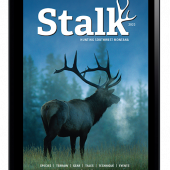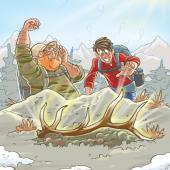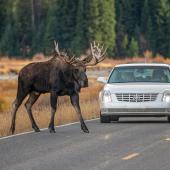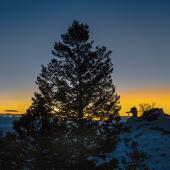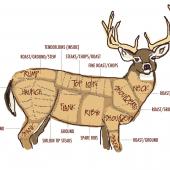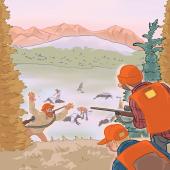Elk
It was Matthew who killed the elk. I was only trying to learn how it was done.
My first year in the valley I knew next to nothing, though when only a week of hunting season remained and still I had no meat, I knew enough to ask Matthew for help. People told me he didn’t like new people coming into the valley and that he wouldn’t help me, wouldn’t help anyone—but when I went to his cabin and asked, he said he would, just this once, and that I would have to watch carefully, and learn: he would only hunt an elk for me once.
We canoed across the Yaak River and went into the wilderness. We found a bull’s tracks, and followed the bull for three days, killing it on the fourth.
Afterward, Matthew built a fire in the woods next to the elk to warm us as we went to work. There was plenty of dry wood and it was easy to make a roaring fire: its flames grew almost as tall as we were, and they lit up the woods. The orange light danced against the elk’s hide and against his antlers, making it seem as if he had come back to life. In his final death leap the elk had got tangled in the blowdown and now hung there, several feet off the ground. Matthew crawled underneath and began cutting. There was a rasping sound of his knife against the coarse hair and thick skin and cartilage, and from time to time he had to stop and sharpen his knife with a whetstone.
“Nothing in the world dulls a steel blade like elk hair,” he said. He was doing a neat job. “I’d like a stone knife someday, black obsidian,” he said. I added wood to the fire. I would not have believed that you could skin such an animal. It was surely enough meat for the coming year.
By the morning we had the elk skinned and the immense antlers sawed off. Matthew had brought a small wood-handled folding saw—its blade was now ruined—and tossed it into the fire. The bull’s immense hindquarters—heavier than a man’s body—were hanging from trees. So, too, were the shoulders.
We filled our packs with the loose meat—all the neck roasts, tenderloins, neck loins, and the lengths of backstrap like deep-red anacondas. In lifting the hindquarters and shoulders, we became covered with blood. I was glad that the bears were already in hibernation.
The fire had sprawled and wandered through the night. Ashes and charred half-lengths of timber lay in a circle thirty feet across: a testament to what had happened here.
We roasted some of the ribs over the coals of the fire and chewed on them for a long time. We ate a whole side if the trimmings from the elk skeleton—the bones were stripped clean and gleaming when we were done—and then broke the other side in half with the hatchet. We tied the rib cages to our packs like a frame; they would help hold in place the shifting weight of the meat, which was still warm against our backs. I gathered a few stones as we were about to leave and, not knowing why, stacked them where the elk had fallen, now a pile of hooves, shins and hair.
Matthew carried the antlers—settled them over his shoulders upside down—and with their long tips and tines furrowing the snow behind him he looked as if he were in a yoke and plowing the snow. I carried the wet hide atop my pack of meat, increasing the weight of my pack up to around 130 pounds. Matthew said it was important to carry out the extraneous stuff first—the antlers, the hide—before our resolve weakened and we were tempted to leave them behind for the wolves.
It began to snow again. I wondered where the other elk were, if they knew that our hunt for them was over.
We stayed on the ridges. Under such a load, our steps were small and slow. We traveled a mile, dropped our weight, then went back to where we’d left all the other meat, and carried it to the point we’d got to before—each of us carrying a hindquarter on his back, or dragging it behind like a sled.
And so we moved across the valley, slowly, as if in some eternal meat relay—continuously undoing the progress we’d made, working hours to move the whole mass only one mile, at which point we then started all over again. The winter-short days passed quickly, and we slept soundly through the nights.
The snow kept coming. We dropped off one ridge down into a creek and ascended another, and Matthew said he knew where we were. After the second or third day, the ravens appeared. They landed in front of us and strutted with outstretched wings, drawing little tracings in the snow, barking and cawing in their voices that were alternately shrill and hoarse, as if they were hurling different languages at us, darted in and pecked at whatever section of the elk we were dragging, but usually they picked at the meat fragments in the snow.
On the third day there was a moment of startling beauty. We were walking in a fog so thick that we could barley see more than a few feet in front of us. We knew to stay on the ridge. Four ravens were following us, walking behind us in their penguin strut. And then to our left, to the west, a slot appeared in the fog, a slot of pale-blue sky, and though the slot there was a shaft of gold light illuminating the forest below us. The shaft was the only thing we could see in the storm. The wind was blowing north, the direction we were going, and for a while the shaft traveled with us. As it did, it kept revealing more of the same uncut, untouched forest. The impression it made was that the uncut forest would never end. In less than a minute, the shaft had moved on—the wind was about 30 miles an hour—but the sight has stayed with me, and neither Matthew nor I said anything about it to each other, though we did stop and watch it, as if unsure of what it was we were
seeing.
We ate on the elk as we traveled but after four days I wanted bread or potatoes. I was tired of all meat. I wanted an apple pie, dense with sugar, and a hot bath.
The massive antlers had sunk lower on Matthew’s shoulders, and the plow they made cut deeper in the snow. Sometimes their heavy tips struck a rock beneath the snow and made a clinking sound. The weight of the antlers was starting to wear Matthew’s skin raw, even though he had cut a small strip of hide to use as a cushion. A thin red “Y” now ran down his back, merging just below his shoulders. The furrows in the snow behind him, wide as the antlers, looked like boundaries for a small road, a lane, and within them we sometimes spotted the tracks of the creatures that were following us: the ravens, coyotes, and wolves.
We were descending slowly, and were beginning to see the tracks of other animals again—deer, moose, and elk, though the elk tracks were those of cows and calves, not bulls.
We were down out of the high country and into the dense forest. It was growing warmer at the lower elevation, so that, rather than snow falling, there was a sleety drizzle, which was more chilling than any storm or blizzard. We came across a dropped moose antler, resting upright on the snow—we could read his tracks leading to it and leading away from it—and the antler, upturned, was full of water and slush from the sleet. We knelt and took turns drinking from it, without disturbing it. We were almost home. One more night, and the next day. A year’s worth of meat, put away safely.
The “Y” on Matthew’s back widened, but he was moving stronger again. I was shivering hard by now. I was drenched. For a long time the effort of hauling and skidding the meat had been enough to keep me warm, but now that effort wasn’t enough. I was cold and I needed help from the outside. My body could no longer hold off the whole mass of winter. I was without reserves.
“Do you want to stop and light a fire?” Matthew asked, watching my slowing movements, my clumsiness, my giving–upness. I nodded, still lucid enough to know that hypothermia had arrived. Matthew seemed to be a great distance away, and I felt that he was studying me, evaluating me. We were no longer partners in the hunt, brothers in the hunt—brothers in anything—and as my mind began to close down, chamber by chamber, I had the feeling that Matthew was going to let me freeze: that he had run me into the ground, had let me haul out half the elk, and now, only a day’s journey from town, he was going to let winter have me. He would carry the rest of the meat out himself, leaving me to disappear beneath the snow.
He stood there waiting. I knelt and slipped out of my pack. I then lost my balance and tipped over in the snow. Not thinking clearly—not thinking at all—I searched through my pack for matches, shivering. I found them, held the small box tightly in my gloved hand, then remembered that I needed wood.
Matthew continued watching me. He had not taken his pack off—as if he had no intention of stopping here anyway—and the antlers had been with him so long that they seemed to be growing out of him. I moved off into the trees and down a slope and began indiscriminately snapping twigs and gathering branches, dropping much of what I picked up. Matthew stayed up on the hill above, watching. The rain and sleet kept coming down. He was drenched, too—there was ice on his antlers—but he seemed to have a fire and a hardness in him that I knew I didn’t have.
I heaped the branches, some green and some dry, into a small pile, and began striking matches; and the sodden pile of wood would not light. I tried until I was out of matches, then rose and went back up to my pack to look for more. I was moving slowly and wanted to lie down. I had to keep going, but I knew that I wasn’t going to find any more matches.
“This way,” Matthew said finally, taking a cigarette lighter out of his pack. “Look at me,” he said. “Watch.” He walked down to the nearest dead tree, an old wind-blasted fir tree, shrouded dense with black hanging lichen. “This is what you do,” he said. His words came in breaths of steam rising into the rain. He stood under the canopy of the tree’s branches and moss cloak and snapped the lighter a couple of times, holding it right up against the lichen tendrils.
On the third snap the lichen caught, burned blue for a moment, then leapt into quick orange flame.
It was like something chemical—the whole tree, or the shell of lichen around it, metamorphosed into bright crackling fire: the lichen burning explosively and the sudden shock of heat, the updraft, in turn lighting the lichen above, accelerating the rush of flame as if climbing a ladder. It was a 40-foot-tall tree, and it was on fire
from top to bottom in five seconds.
“That’s how you do it,” Matthew said, stepping back. I had stopped shivering, my blood heated by one last squeeze of adrenaline at the sight; but now, even as I watched the flames, the chill, and then the shivering, returned.
“You’d better get on over there,” he said. “They don’t burn long.”
I walked over to the burning tree. There was a lot of heat; the snow in all directions glistened—but I knew that the heat wasn’t going to last. Flaming wisps of lichen separated from the tree and floated upward in curls before cooling and descending. By the time they landed on me, they were almost burnt out—charcoal skeletons of the lichen. A few of the tree’s branches burned and crackled, but that was pretty much it; the fire was gone.
I wouldn’t say I was warm, but I had stopped shivering.
“Come on,” Matthew said. “Let’s go find another one.” He set off into the rain, the antlers behind him plowing a path.
And that was how we came out of the mountains, in that last night and the next day, moving from tree to tree—looking for the right one, properly dead—through the drizzle, from one tower of flame to the next, Matthew probing the right ones with his cigarette lighter, testing them, always choosing the right ones. That was how we walked through that night—the trees sizzling and steaming after we were done with them—and on into the gray rainy day. We were back into the country that I knew well, even underneath all the snow. We were seeing the tracks of wolves, and finding some of their kills. I had stopped shivering, though we continued lighting tree torches—leaving a crooked, wandering path of them behind us.
I suspect that in 20 years I will still be able to trace our journey backward, back up the mountain from torched tree to torched tree. Some will be fallen and rotting black husks, others might still be standing. In 20 years, I’ll be able to return to where it all started—that point where we first saw the elk, and then lost him, and then found him again, and killed him. From among the stones and ferns and forest, there will be a piece of charcoal, a fire-blackened rock, an antler in a tree, a rusting saw blade, even a scabbed over set of initials, where Matthew marked his kill, although as the years go on, those initials will be harder to find, until finally you will have to know exactly where they are and have some sort of guide, someone who has actually been there before to show you.
The rut was on as we approached the town the next day—the giant bucks chasing the does—and though we were exhausted, we could see that we had to shoot a deer.
As we drew nearer the village—the forest ripe with scent of rut must—we saw a swarm of antlers, dozens of bucks prowling the woods, mesmerized by sex, by creation, by the needs of the future, and we were almost home when we saw the buck we wanted.
We saw him because he had seen us, and was coming up the hill toward us, or rather, toward Matthew. He was drawn by the sight of the giant antlers strapped to Matthew’s back. We were moving through the dense brush and it’s possible that was all he could see, and he came forward with a strange aggression. He was wet from the rain. His antlers were black-brown, from his having lived in a dark forest, and rose three feet above his head and extended beyond the tips of his outstretched ears. It did not seem possible that he could carry such a weight on his head. Matthew dropped to his knees. The deer stopped, then came closer, still entranced by the antlers, and Matthew raised his rifle and shot the deer through the neck, now not 20 yards away.
The deer’s head snapped back, and we saw a thin pattern of blood spray across the snow behind him, but the deer did not drop. Instead it whirled and ran down the hill, hard and strong.
I wondered if Matthew could ever finish anything gracefully.
We had to track it.
The snow was deep and slushy. There was little if any blood trail to follow, and the big buck’s tracks merged with hundreds of others: the carnival of the rut. We stood there in the hissing, steady rain, breathing our own milky vapors.
“Fuck,” Matthew said. He looked down toward the river in the direction the buck had run. He dropped his pack in the snow. The bloody “Y” on his chest was the same as the one on his back; the two together were like the delicate, perfect, world-shaped markings on the wings of some obscure tropical butterfly. I dropped my pack as well. A blood trail was beginning to form on my own back and chest.
Not to be wearing a pack after having carried one for so long gave us a feeling like flight; as if, suddenly, we could have gone for another 75 miles. We rested a moment, then donned our packs again. The rain and slush continued to beat down on us. We kept stopping to rest, ass-whipped. We began lighting trees again—tree after tree, following the wounded buck’s tracks.
A drop of blood here; a loose hair there.
We found the buck down at the river, in a backwater slough, thrashing around in six feet of water, having broken through the skin of thawing ice as he tried to cross. We watched him for a moment as he swam in circles with only his head and the tower of antlers above the water. He was choking on his blood, coughing sprays of it across the water with each exhalation, and swallowing blood with each breath—the bullet had missed an artery, but severed a vessel—and his face was a red mask of blood.
He glared at us as he swam—a red king, defiant. It was a strange sight, those giant antlers going around and around in the small pond—like some new creature being born into the world. Matthew raised his rifle, waited for the deer to swim back around, closer to the edge of the shore.
The deer continued to watch us as it swam—head held high, drowning in blood.
Matthew shot it in the neck again, breaking it this time, and the deer stopped
swimming. The antlers sank.
We sat and stared at it for a long time—watching it motionless through the refraction of water—as if expecting it to come back to life.
Another buck, following the trail of the giant’s hock musk, appeared on the other side of the pond, lowered its head, trying to decipher the cone of scent that had drifted its way.
We traveled upriver to where Matthew had left the canoe. It was under a shell of snow. We got it out and went and got the elk and loaded it, part by part, into the canoe, until the canoe was low in the water. Dusk was coming on again and we could see a few lights across the river, the lights of town. We had been gone only two weeks but it felt like a century.
I stayed behind while Matthew made two crossings with the meat; then he came back for me. The rain had stopped and the sky was clearing and Matthew said we had to get the deer out now as the pond would freeze thick if we waited until the next day.
We waded out into the pond together. The water was slightly warmer than the air. Under water the deer was light, and we were able to muscle him awkwardly up the shore. Then we dragged him over to the canoe—gutted him quickly—loaded him, and set out across one more time, riding lower than ever. Freezing seemed to be a more imminent danger than drowning, but we reached the other shore, sledded the canoe up onto the gravel and finally we quit; abandoned the meat, hundreds of pounds of it, only a short distance from home, and ran stumbling and falling up the hill toward town.
Lights were on in the bar. We went straight in and lay down next to the big woodstove, shivering and in pain. The bartenders, Artie and Charlie, came over with blankets and hides and began helping us out of our wet clothes and wrapping the hides around us. They started heating water on the stove for baths and making hot tea for us to drink; it was the first fluid we’d had in days that was neither snow nor cold creek water, and the heat of it made us vomit the second the hot tea hit our stomachs. Artie looked at the meat we had spit up and said, “They got an elk.”
This essay originally appeared in the New Yorker.







